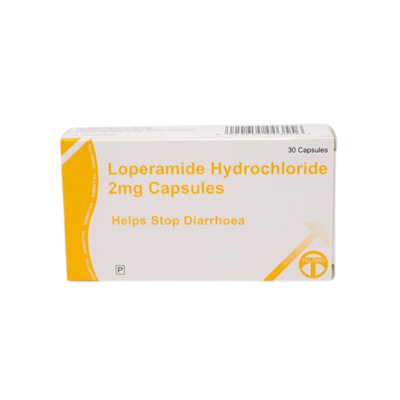Loperamide
- Fast Relief from Diarrhoea
- Helps Prevent Dehydration
- Easy to Use
- Convenient for Travel
Loperamide
Category:Traveller's DiarrhoeaFetching Data...
All inclusive services
No extra costs
Free tracked delivery
Delivered in plain packaging
Prescription included
No consultation charges
Frequently Asked Questions for Loperamide
What is loperamide?
Loperamide is an anti-diarrhoea medication that helps reduce frequent and loose stools by slowing down bowel movement. It works by reducing spasms in the intestines, allowing the body to absorb more water, which results in firmer stools and fewer trips to the toilet. It is commonly used to treat travellers’ diarrhoea, providing fast relief and helping to prevent excessive fluid loss.
How Does Loperamide Work?
Loperamide works by acting on opioid receptors in the gut, reducing the natural movement of the intestines. This slows down digestion, allowing more water to be absorbed, leading to firmer stools and less frequent bowel movements.
How to Take Loperamide
- Take two capsules immediately when diarrhoea starts.
- After that, take one capsule after each episode of diarrhoea, up to a maximum of 6 capsules (12mg) per day.
- The usual dose for most people is 3-4 capsules (6-8mg) daily.
- If diarrhoea persists after 48 hours, stop taking loperamide and seek medical advice.
Loperamide does not treat the underlying cause of diarrhoea, so if symptoms worsen or persist, a doctor should be consulted.
Side Effects
Loperamide is generally well tolerated, but some people may experience mild side effects, including:
- Nausea (feeling sick).
- Constipation.
- Headache.
- Drowsiness or dizziness – If affected, avoid driving, cycling, or operating machinery.
Most side effects are temporary and improve once treatment is stopped.
Warnings and Precautions
Loperamide is not suitable for everyone, and should be avoided in certain conditions.
Do NOT take loperamide if you:
- Develop diarrhoea after taking antibiotics.
- Have bloody diarrhoea with a high fever.
- Have an inflammatory bowel condition, such as Crohn’s disease or ulcerative colitis.
- Had prolonged constipation before diarrhoea started.
- Have liver disease, as it may not be processed properly.
- Are pregnant or breastfeeding.
- Are a child under 12 years old.
Potential Drug Interactions
Certain medications can increase the effects of loperamide, including:
- Ritonavir (for HIV treatment).
- Quinidine (for heart rhythm conditions or malaria).
- Itraconazole or ketoconazole (for fungal infections).
- Gemfibrozil (for high cholesterol).
Always check with a doctor or pharmacist if you are taking any other medications before using loperamide.
Additional Advice for Managing Diarrhoea
- Stay hydrated – Drink at least 3-4 litres of fluids per day to replace lost fluids.
- Avoid caffeine, alcohol, and dairy, as these can worsen diarrhoea.
- Rest and eat light foods such as bananas, rice, toast, and soup.
- If symptoms persist beyond 48 hours, seek medical attention for further treatment.
Loperamide is a fast and effective way to control diarrhoea, especially for travellers, but should be used responsibly and only when necessary.
